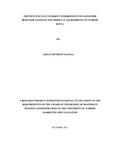| dc.description.abstract | The world of work puts the importance of human capital and indeed human capital
development and retention of good caliber employee at the center of organizational
success or failure. The employment relationship is undergoing fundamental changes that
have implications for the attraction, motivation and retention of talented employees.
Retention is a voluntary move by organizations to create an environment which engages
performing employees for a long term. Organization understand that tenured workforces
not only reduce the separation, recruiting, selection and hiring costs associated with the
churning of employees, but also become more productive over time, resulting in higher
competitiveness and added profitability. Therefore, this study sought to establish the
influence of job related factors, individual related factors and organizational factors on
employee turnover. The study adopted a cross sectional survey design targeting
employees in the eighteen (18) medium size restaurants in Nairobi Central Business
District. The study collected primary data using semi-structured questionnaire. The study
used descriptive statistics and inferential statistics to analyse the data collected. The study
found out that interpersonal relationship, search for career development opportunities and
better pay, age and gender of the employee, education level, Term of tenure and Job
security were the individual related factors that were established to influence employee
turnover in medium size restaurants in Nairobi Central Business District. Further, the
study established that high workload, role ambiguity, poor working conditions, poor pay,
strict supervision and heteronomy were the job related factors which influenced
employee turnover in the restaurants. Finally, poor recruitment processes, structural
employment, poor leadership, inadequate promotional opportunities and rewards,
organizational culture and climate, poor communication channels and inadequate
organizational commitment are organizational factors that influences employee turnover
in the restaurants. The study therefore concludes that organizational factors, job related
factors and individual related factors influences employee turnover in medium sized
restaurants in Nairobi Central Business District. The study recommends that management
of the restaurants should enhance positive working environment through ensuring
positive relationship among workers, timely remuneration offering clear job guidelines to
ensure employee satisfaction and hence reduce employee turnover in the restaurants. | en |

